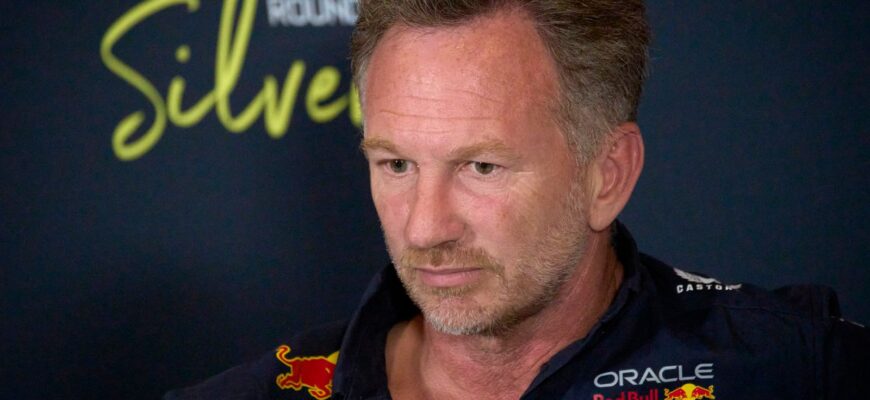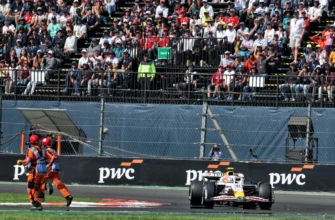The sporting world was taken aback by Red Bull`s decision to dismiss Christian Horner, F1`s longest-serving team principal, effective immediately. A statement from Red Bull confirmed Horner`s departure after 20 years leading the team but offered no specific reason for the 51-year-old`s removal.
Reports indicate Horner was not given a specific reason by Red Bull for the dismissal. Laurent Mekies, formerly heading the junior Racing Bulls team, has been appointed as his replacement.
While a sudden departure midway through the season is surprising, the eventful nature of his last 18 months at the helm suggests several potential factors could have contributed to Red Bull`s decision. As the situation surrounding Horner`s exit remains fluid, this analysis explores potential factors that may have led to his demise.
Red Bull on a downward trend?
Following a stellar 2023 season where Max Verstappen secured the drivers` title and Red Bull won 21 out of 22 races, the team began 2024 strongly with four wins in five rounds. However, Ferrari and McLaren rapidly closed the gap from the Miami Grand Prix in May 2024 onwards. Verstappen relied on his early points lead to clinch his fourth consecutive drivers` title ahead of Lando Norris.
This inconsistent performance from the latter half of last year has persisted into the current season. Red Bull is clearly trailing McLaren, with the points deficit to the frontrunners approaching 300 at the season`s midpoint.
While Horner has navigated previous periods without victories for Red Bull, the rapid decline in performance within the same regulatory era is unusual and concerning in Formula 1. Although the performance dip is undoubtedly a concern for Red Bull management, Horner`s departure seems unlikely to be solely based on this season`s results, given his achievement of four consecutive drivers` titles just six months prior.
Red Bull`s second seat woes
While Verstappen has been Red Bull`s primary contender against McLaren this season, the performance of the second car has become a notable issue for the team. Horner`s decision-making regarding drivers had already faced questions after Sergio Perez was reportedly paid off upon being dropped last season, despite receiving a contract extension just six months earlier.
The situation worsened this year when Liam Lawson was demoted back to Racing Bulls only two races into the season. This followed Horner`s initial decision to promote Lawson over the more experienced Yuki Tsunoda. Tsunoda`s performance has generally been behind both Lawson and his Racing Bulls teammate Isack Hadjar.
This struggle with the second driver is not new for Red Bull. Pierre Gasly and Alex Albon, now established F1 drivers, were let go in 2019 and 2020 after failing to match Verstappen. However, the performance gap between the two Red Bull cars this season appears wider than ever.
Whether attributed to poor driver choices or an inherent car design issue that makes it difficult for drivers other than Max, this situation reflects poorly on Horner`s leadership.
Was it `Verstappen or Horner`?
Red Bull`s transformation into effectively a one-car team over the past couple of years has significantly increased the influence of Max Verstappen and, perhaps more critically, his management team. While Max Verstappen`s relationship with Horner seemed consistently good, the same wasn`t true for his father, Jos.
Jos Verstappen publicly called for Horner`s removal during a public disagreement early in 2024. Although the situation seemed to stabilize, the intensity of the conflict suggested the relationship might be permanently damaged. Meanwhile, Max Verstappen has always been open about his trust and loyalty to his father.
This summer, the focus in F1 has been on Verstappen`s future, particularly after Mercedes team principal Toto Wolff confirmed discussions with Verstappen`s representatives (his father and manager Raymond Vermeulen). A theory suggests that given Red Bull`s strong reliance on Verstappen, his camp may have leveraged his potential future to pressure owners into removing Horner, implying Verstappen would be more likely to stay with a change in leadership.
Verstappen`s contract with Red Bull runs until 2028 but includes known exit clauses. Following Wolff`s remarks, Verstappen has been non-committal about his long-term future at Red Bull.
It will be interesting to observe future developments. If Verstappen remains with the team next year, some might see a connection to Horner`s departure. If he leaves, this theory may be discredited.
Allegations against Horner still having an impact?
A significant blow to Horner`s authority came in February 2024 with allegations of inappropriate behavior made by a female employee. Horner consistently denied the allegations. Although his position was initially threatened, a Red Bull investigation cleared him, and a subsequent appeal by the employee was dismissed.
This period coincided with the public conflict with Jos Verstappen, who stated the accusations made Horner`s position untenable. Horner previously maintained support from at least a segment of Red Bull`s ownership, but for reasons unknown, that support seems to have waned.
Reports suggest Red Bull co-owner Chalerm Yoovidhya, who had previously supported Horner through the investigations, eventually withdrew that support.
High-profile departures at Red Bull
The period surrounding the allegations also saw several key figures leave Red Bull. While personnel changes are common in F1, the departure of three crucial individuals involved in Red Bull`s success reflected poorly on Horner.
Undoubtedly the most significant departure was legendary F1 designer Adrian Newey, who had worked with Horner almost since the beginning of Red Bull Racing. Their previously close relationship had reportedly deteriorated, with the allegations against Horner believed to be a factor in Newey`s decision to leave in May 2024 and join Aston Martin as managing technical partner.
Prior to Newey`s departure, chief designer Rob Marshall moved to McLaren in 2023. McLaren`s recent ascendance to become a dominant force in the sport could be linked to this personnel change.
Most recently, sporting director Jonathan Wheatley left to take on the team principal role at Sauber, which will become Audi in 2026.
While some staff turnover is expected, losing three long-standing and influential figures in such a short timeframe, particularly as performance declined, did not reflect well on Horner`s management.
A victim in Red Bull`s power struggle?
Significant shifts also occurred within Red Bull`s senior management after the death of co-founder Dietrich Mateschitz in October 2022, leading to an apparent power struggle for control of the F1 team.
Horner was central to this struggle, reportedly backed by Thailand`s Chalerm Yoovidhya (co-owner) but not necessarily by Mark Mateschitz, Dietrich`s son who owns 49% of the business. Unlike his father, Mark Mateschitz has not maintained direct involvement in the team`s operations. Oliver Mintzlaff, Red Bull`s head of sport who also oversees their football clubs, has taken a more prominent role.
Mintzlaff was the one who issued the statement thanking Horner for his service upon confirming the dismissal.
Despite his track record of success, Horner`s significant power within the organization seemed to lessen from 2022 onwards.
According to some reports, the Austrian faction of the business, supported by Jos Verstappen, ultimately prevailed in this power struggle, reportedly convincing Horner`s allies that his position was untenable. The specific reasons behind this will likely emerge over time.
A sign Red Bull`s 2026 engine is not on track?
Looking ahead, 2026 brings what many consider the most significant regulatory changes in F1 history, with new, more sustainable engine regulations being a key component. For the first time, Red Bull has established its own engine division, Red Bull Powertrains, to develop and build their own power unit.
Competing immediately with established engine suppliers like Mercedes and Ferrari would be challenging for any newcomer, and the complexity of the 2026 regulations increases this difficulty. Speculation within the F1 paddock suggests Mercedes may be ahead in 2026 engine development, with some reports indicating Red Bull is facing difficulties with their project.
While currently only speculation, if Red Bull`s leadership has received unfavorable reports on the engine project`s progress, it could have influenced their view of Horner`s performance. Any confirmation regarding the engine project`s status likely won`t come until 2026 pre-season testing.






